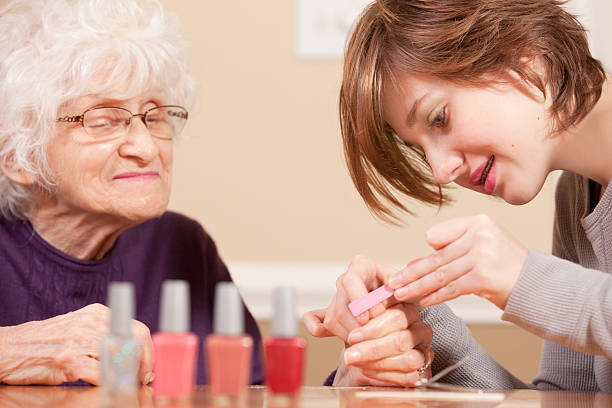Senior Home Nail Treatment: Essential Care for Healthy Nails and Feet
As we age, nail care becomes increasingly important but also more challenging. Thicker, more brittle nails, along with common age-related conditions, can make regular nail maintenance difficult. Senior Home Nail Treatment provides a safe and comfortable way for seniors to receive essential nail care right at home. This article will cover the key benefits, essential steps, and considerations for effective Senior Home Nail Treatment. Additionally, we’ll explore why Foot Care For Seniors is so vital, not only for hygiene but for overall mobility, comfort, and health.
Regular nail care is crucial in preventing infections, reducing pain, and enhancing seniors’ comfort and mobility. By following a comprehensive guide, caregivers and family members can ensure that senior nail care is safe, effective, and enjoyable.

Nail and Foot Care For Seniors play a vital role in maintaining health and mobility. With age, toenails often become harder and more susceptible to conditions like fungal infections and ingrown nails. Regular, gentle care can prevent many issues that, if left unaddressed, could lead to pain, infections, or even mobility challenges.
Senior Home Nail Treatment offers a convenient solution, providing seniors with a comfortable environment to receive proper care without the need for travel. Home treatments are not only more comfortable for many seniors, but they also allow for a more personalized approach that meets individual needs.

Senior Home Nail Treatment involves several steps to ensure both safety and effectiveness. Here’s a breakdown of what a typical treatment session might include:
Begin by soaking the feet in warm water for 10–15 minutes. This softens the nails and makes them easier to trim, especially if they’ve thickened over time. Adding a mild soap or a pinch of Epsom salt can help relax the feet and make the experience more enjoyable.
After soaking, gently pat the feet dry with a soft towel, ensuring the areas between the toes are thoroughly dried. This is important to prevent fungal infections and to maintain healthy skin around the nails.
Using clippers designed for seniors, trim the nails straight across to prevent ingrown toenails. Filing down sharp edges can prevent accidental scratches and create a smoother nail surface. Seniors with thicker nails may benefit from specialized clippers or nail care tools designed for thicker or more brittle nails.
After trimming, a gentle moisturizer can help keep the skin around the nails hydrated. This is particularly helpful for seniors, as their skin tends to be drier. Look for products that contain natural ingredients and avoid heavy fragrances, as these may irritate sensitive skin.
If a senior has a history of fungal infections, applying an antifungal cream can be beneficial. Regular application of antifungal treatments can prevent infections and maintain healthier nails.
Keeping nail care tools clean is essential to avoid cross-contamination. After each session, sanitize the tools and ensure the space is clean and tidy.

Many seniors face specific nail issues due to age-related changes. Here are some common challenges and how Senior Home Nail Treatment can help:
Thicker nails are often harder to trim and can make walking uncomfortable. Regular soaking and using specialized tools can help make these nails easier to care for at home. In cases where nails become too difficult to manage, a trained professional should be consulted.
Cutting nails too short or curving them at the edges can cause painful ingrown nails. To prevent this, always trim nails straight across. If ingrown nails occur frequently, a professional can help address the issue without causing further injury.
Fungal infections are common among older adults and can cause discoloration, thickening, and even pain. A consistent antifungal treatment plan, combined with proper hygiene, can manage these infections effectively. For severe cases, consulting a podiatrist is recommended.
Aging nails are more likely to be brittle and split easily. Regular moisturizing and avoiding harsh chemicals can help strengthen nails. Supplements like biotin, when recommended by a healthcare provider, may also improve nail health.

While some seniors may choose to maintain their nails independently, professional care offers significant advantages, especially for those with limited mobility or complex health concerns.
Even with regular Senior Home Nail Treatment, seniors can take steps to maintain nail and foot health between appointments. Here are some simple tips:

In some cases, seniors may need more specialized care beyond standard Senior Home Nail Treatment. Here are a few signs that indicate it’s time to see a healthcare provider:
Senior Home Nail Treatment offers a practical and comfortable way for seniors to maintain nail health, reduce foot pain, and prevent infections. This service not only makes nail care more accessible but also ensures that seniors receive tailored care that meets their unique needs. When combined with a focus on Foot Care For Seniors, home nail treatments can help maintain mobility, enhance comfort, and support overall well-being.
By prioritizing regular nail care at home, seniors can look forward to healthier feet, improved confidence, and the reassurance that their health and comfort are in good hands.